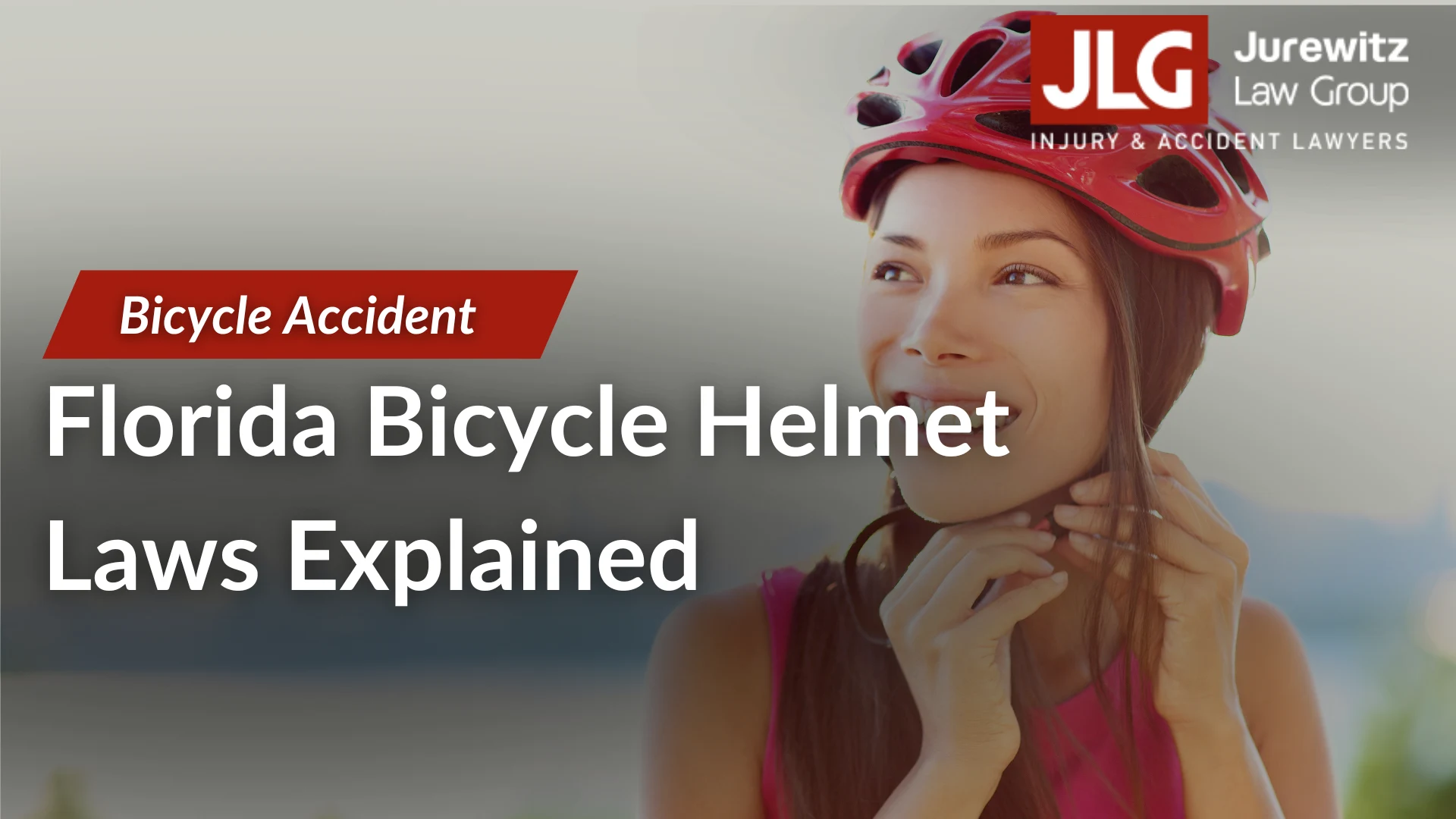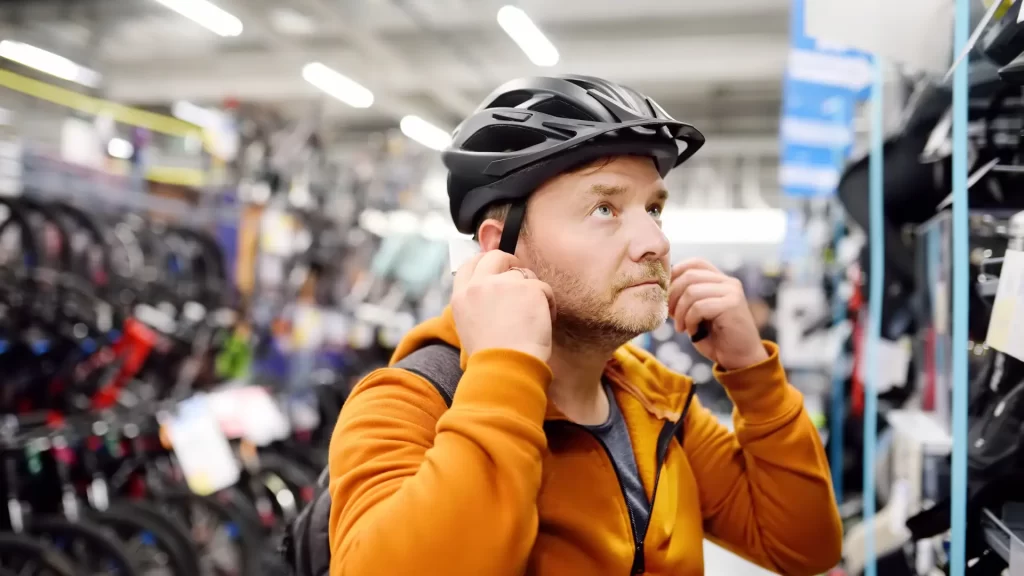
Familiarizing yourself with some of Florida bicycle helmet law is essential if you ride a bike to get around. Obeying the law keeps you safe and helps you avoid fines.
It may also affect how much compensation you could receive after a wreck that results in head injuries. If you’ve been in a Florida bicycle crash, whether you obeyed safety laws might affect your case’s outcome.
The Florida Bicycle Helmet Law
Florida’s bicycle regulations law establishes the following requirements for wearing a helmet while riding a bicycle in Florida:
- All bicycle riders and passengers under the age of 16 must wear helmets.
- A helmet must fit a wearer properly and be securely strapped.
- A helmet must meet federal safety standards for bicycle helmets. Look for an indication on a bicycle helmet or its packaging stating it complies with 16 C.F.R. part 1203.
The above requirements also apply to children riding in trailers or semi-trailers attached to bicycles.
Legal Consequences of Not Wearing a Helmet While Riding a Bike in Florida
Failing to obey the Florida bicycle helmet law is a pedestrian violation. The fine for such a violation is $15.
The court may dismiss the charge against someone riding on a bicycle without a helmet only if they can prove they have purchased a helmet. This includes helmets that comply with federal safety standards.
The law doesn’t require anyone over the age of 16 to wear a helmet while operating or riding a bicycle. Thus, those who violate Florida’s bicycle helmet law are always minors.
As such, they may not face significant legal consequences. The law permits cops and crossing guards to issue verbal warnings when minors don’t wear helmets. They may also issue brochures promoting cycling safety for minors.
Federal Safety Standards for Bicycle Helmets in Florida
The U.S. Consumer Product Safety Commission (CPSC) provides information about the safety standards to which bicycle helmets must adhere under federal law. These are just some of the requirements bicycle helmets must meet:
- Bicycle helmets shouldn’t unreasonably block wearers’ peripheral vision.
- A helmet shouldn’t easily come off a rider if they fall.
- The straps keeping a helmet secure on a rider should stretch to such an extent that they may allow a helmet to fall off in the event of a crash.
- A helmet should effectively reduce the force of impact when a rider strikes their head to guard against injury.
Helmets must go through a range of tests to ensure they meet these requirements. That’s why buying a helmet that conforms to the applicable standards is so important. Depending on the circumstances, wearing such a helmet may be a legal requirement. A helmet that conforms to the proper standards will also be more likely to offer sufficient protection in a crash.
Child Safety Laws for Cyclists in Florida
The law requiring certain bicyclists and passengers to wear helmets also establishes certain child safety requirements for bicyclists in Florida. Some of the child-centric Florida bicycle helmet laws are:
- An adult rider may carry a child in a backpack or sling when riding a bicycle, even if the bicycle’s design technically only supports one passenger.
- Except as provided above, when riding with a child passenger who is under four years of age or weighs 40 pounds or less, a bicyclist must carry a child in a seat or carrier designed for a passenger of their size. The seat or carrier must protect them from the bicycle’s moving parts.
- A bicyclist can’t leave a child (or any other passenger) in a seat or carrier if the bicyclist doesn’t have immediate control over the vehicle.
The law also prohibits the parents or guardians of minor children from permitting them to violate any of Florida’s bicycle safety laws.
How Helmet Laws Affect Bicycle Accident Claims in Florida
 You may file a claim or lawsuit against a motorist who caused your injuries if you’ve been hurt in a Florida motorcycle crash. Your injuries must be severe enough to meet a “tort threshold” under Florida law to grant you the right to take legal action against an at-fault party.
You may file a claim or lawsuit against a motorist who caused your injuries if you’ve been hurt in a Florida motorcycle crash. Your injuries must be severe enough to meet a “tort threshold” under Florida law to grant you the right to take legal action against an at-fault party.
Failure to wear a helmet could affect how much compensation you receive in these circumstances. If you didn’t wear a helmet, a liable party could argue your injuries would have been less severe had you obeyed the law.
Florida’s comparative fault law states that someone may not receive compensation for their losses if they are more than 50 percent responsible for their injuries. If someone is less than 50 percent at fault for their injuries, but nevertheless shares some of the blame, the amount of compensation they receive may depend on how much blame is assigned to them.
For example, maybe you’re seeking $10,000 in compensation. Perhaps you would be eligible to receive that amount if the target of your claim was entirely responsible for your injuries. However, maybe it’s determined you’re 30 percent to blame because you failed to wear a helmet. If so, the most compensation you would be eligible to receive would be $7,000. The amount of compensation you might be eligible to receive could be even lower if it’s determined you failed to wear a helmet when the Florida bicycle helmet law required you to.
Promoting Bicycle Safety for Minors
Per the Centers for Disease Control and Prevention (CDC), bicycle crash injuries are most common among children, teens, and young adults. This may be because younger people are more likely than others to ride bicycles. They may also be more likely to engage in risky behaviors.
Ways to encourage minors to practice good bicycle safety include:
- Modeling good practices, like wearing a helmet and obeying the rules of the road
- Letting caregivers know children must wear helmets when riding bikes
- Participating in or organizing community education programs regarding bicycle safety for minors
Contact a Florida Bicycle Accident Lawyer
If you or your child has been hurt in a Florida bicycle accident, a Tampa bicycle accident attorney at Jurewitz Law Group Injury & Accident Lawyers may help you pursue compensation. Our team of lawyers can also explain how factors like whether you or your child was wearing a helmet can influence your case. Learn more about Florida bicycle helmet law by contacting us online or calling our firm at (619) 233-5020 for a free case review. Our firm, with its years of experience and skills, will get you the best outcome possible for your injury claims.


